During last week’s National Press Club Debate, Defence Minister Peter Dutton was determined to keep afloat false claims that Labor had done a back-door deal with the Chinese Communist Party (CCP). Citing Prime Minister Scott Morrison’s now defunct WeChat account as evidence of foreign interference, Dutton declared there was “no question at all” that the “CCP would like to see a change of government.” Morrison’s WeChat account was taken over and rebranded back in January, but a First Draft investigation found no evidence that the account was hacked or tampered with. Nonetheless, the narrative played well into the “reds under the bed” rhetoric that has gathered steam over the past few months. Be it promoting racist tropes, slandering “pro-Communist” politicians, speaking in the parlance of war, or hitting home with an Acrostic poem for “CHINA”, both major and minor parties are mobilising and monetising fears over alleged CCP interference for election gains.
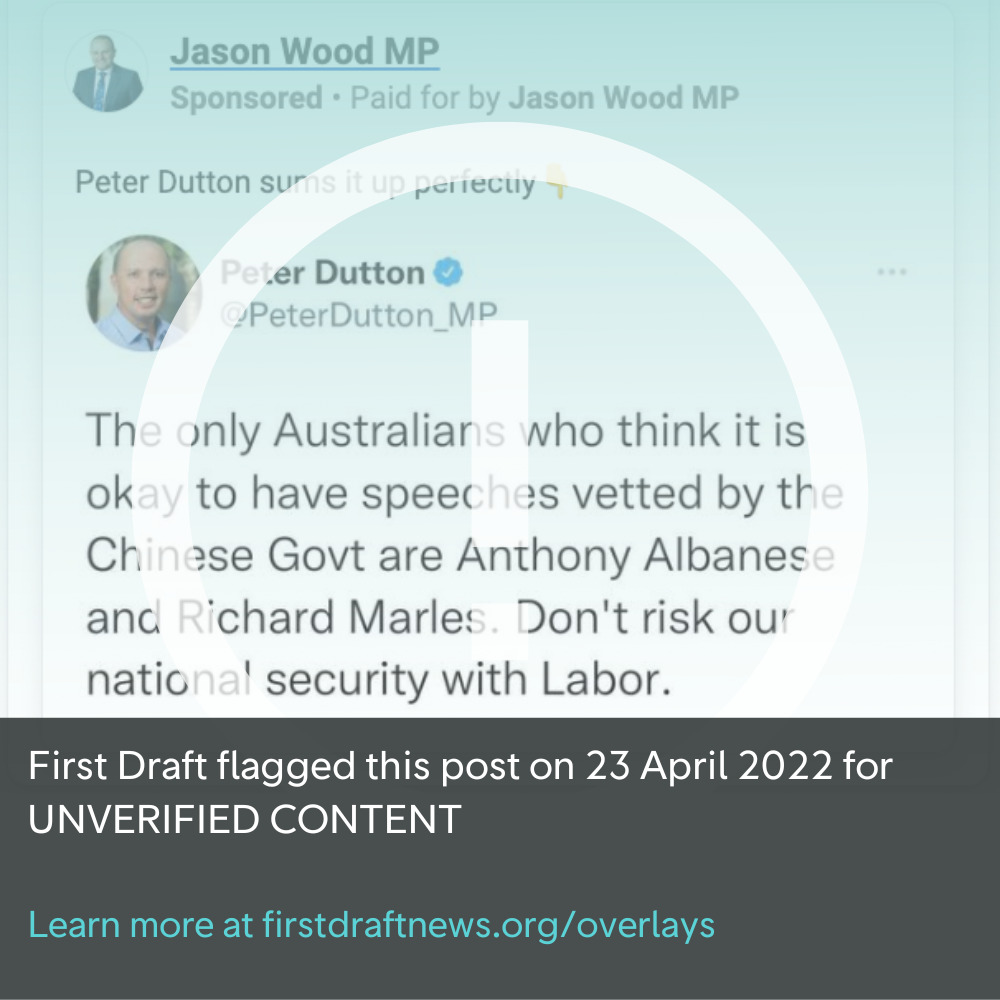
Facebook ad endorsing a tweet from Defence Minister Peter Dutton containing unverified claims about the CCP.
Alleged Chinese interference is not a foreign phenomenon in Australian politics. Individuals and entities with links to the CCP attempting to funnel funds and toe a red line have previously been caught out by Australian spy agencies. But past culpability and capability doesn’t translate to de facto interference here and now. This election, it is the Australian political class that are buoying the CCP to push their own red line on voters.
Whilst the incumbent Liberal-National Coalition government continue to channel their CCP-cosy campaign against Labor Leader Anthony Albanese, Deputy Richard Marles, and foreign affairs spokesperson Penny Wong; Liberal candidate for Chisholm Gladys Liu was the latest politician to become a vehicle for allegations of foreign interference both on and offline.
During the 2019 Australian federal election, Liu’s purported CCP connections featured as an election flashpoint. This round, Liu was accused of “taking money from the Chinese government” at a community debate and branded a Chinese spy on the official Facebook page of Labor’s state Queensland branch. Offline tactics have gone into overdrive with Liu’s face doing the rounds on roving billboard ads that label her “Xi Jinping’s candidate for Chisholm” and encourage voters to “Flush the Liu”. Queensland Senate candidate and outspoken CCP-critic Drew Pavlou is behind the campaign. Pavlou also plastered South Australian Senator Nick Xenophon onto a truck, calling him “China’s Puppet” for his legal work with Huawei. He also drove home the same message (in a more stationary manner) with a video ad claiming Xenophon was “supporting genocide” and helping to throw Uyghurs into concentration camps.
‘China on the move’ has been a common trope in the Australian 2022 federal election. Conservative lobby group Advance Australia’s so-called “truth truck” also took a ‘Labor-leaning’ Chinese President Xi Jinping on tour around Australia.
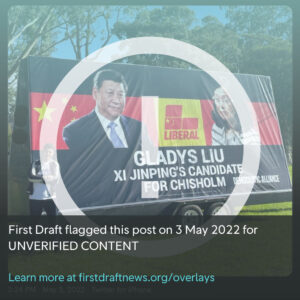
Mobile billboard that claims Chisholm MP Gladys Liu is backed by the Chinese government.
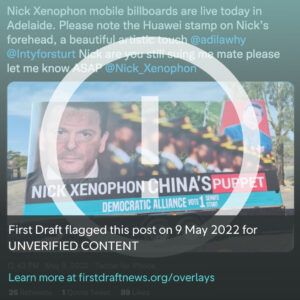
Mobile billboard that claims South Australian Senator Nick Xenophon is “China’s puppet”.
Official Labor party advertising took a different approach to Gladys Liu. Sidestepping the “Chinese spy” narrative, they instead ran with a laundry list of political “tricks” Liu allegedly employed during the 2019 federal election. These include dissemination of “fake news on Chinese messaging apps,” being forced to return $300,000 from donors “deemed a national security risk,” and attempting to trick voters with AEC-themed signage. Facebook ads from both the Australian Labor Party and the Victorian Labor Party link through to a website titled “Chisholm Deserves Better”, which details the aforementioned “tricks”.
First Draft has been closely monitoring Facebook’s online Ad Library this election and found minor parties have also rolled out the red carpet for foreign interference fearmongering. Clive Palmer’s United Australia Party (UAP) declared that “Australians must now be concerned that our politicians are acting in the interest of the Chinese Communist Government and not Australia,” urging voters to vote for the UAP to “stop the clandestine take-over of our country.” One Nation have taken a similar line. Their Tasmanian Senate candidate Steve Mav did not hold back with an Acrostic poem for “China” titled, “5 words to describe the enemy that wants Australia.” It reads: “Control, Harmful, Illegal, Nasty, Aggressive.”
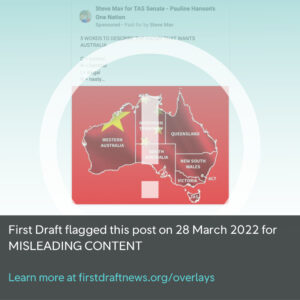
Facebook ad turned Acrostic poem from a One Nation Senate candidate.
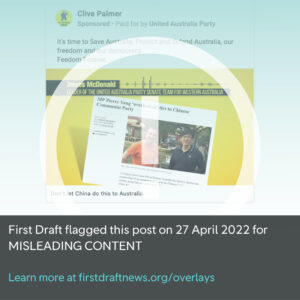
Facebook ad from Clive Palmer that claims Australian politicians are working for China.
Pro-freedom minor parties are also pouring money into online ads that claim the Australian government is rolling out “mass biometric surveillance” comparable to China, and that Australia is moving towards a “social credit system like what there is in China”. One Nation even took the liberty to run a racist trope of bat soup in their latest animation “Please Explain Voter Fraud”. The video was swiftly removed from social media sites over false claims of election fraud, but the racist rant only ruffled a few feathers.
With an election looming, political parties and candidates of all stripes are attempting to leverage ongoing tensions between Australia and China and apprehension of foreign interference to shore up votes. Whilst national security remains a very real concern, this is fearmongering at its finest.
Stay up to date with First Draft’s work by becoming a subscriber and following us on Facebook and Twitter.
The post Ratcheting up a red line: How China is being used in the Australian election campaign appeared first on First Draft.